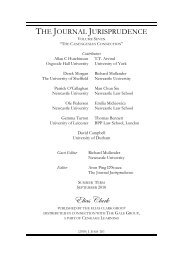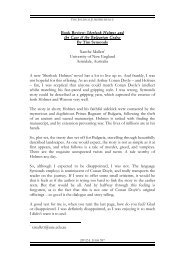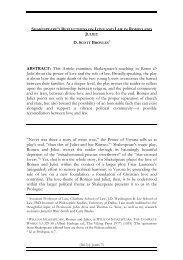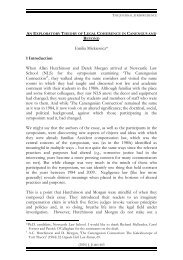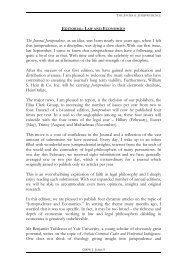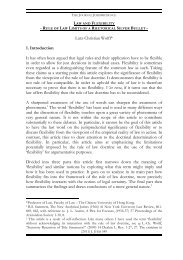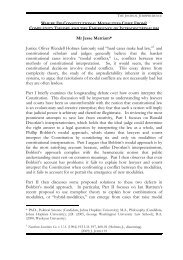On the Formation of the American Corporate State - The Journal ...
On the Formation of the American Corporate State - The Journal ...
On the Formation of the American Corporate State - The Journal ...
Create successful ePaper yourself
Turn your PDF publications into a flip-book with our unique Google optimized e-Paper software.
SKOURAS ON THE FORMATION OF THE AMERICAN CORPORATE STATE:THE FULLER SUPREME COURT, 1888-1910contract without government intervention. So those later generations <strong>of</strong>intellectuals that want to condemn <strong>the</strong> Lochner-era are mistaken because <strong>the</strong>People spoke, and <strong>the</strong>y decisively chose McKinley over Bryan.What is missing here is <strong>the</strong> critical element that leaves a number <strong>of</strong> questionsand gaps in <strong>the</strong> literature as to why <strong>the</strong> Supreme Court was justified in reading<strong>the</strong> Fourteenth Amendment as pro-business and anti-labor provision based onelection returns. Who is ‘We <strong>the</strong> People’ that Ackerman has in mind? 52 Does itmatter even if ‘we are people’ capable <strong>of</strong> empowering such a system? Couldpatronage interfere with <strong>the</strong> goals <strong>of</strong> ‘we <strong>the</strong> people’? Does it matter whe<strong>the</strong>rgiant corporation are able to displacing <strong>the</strong>se laws if <strong>the</strong>se laws do not suit <strong>the</strong>irinterests? Does <strong>the</strong> existence <strong>of</strong> a Spoils System 53 matter as far as elections and<strong>the</strong> electorate is concerned? Ackerman seems to set <strong>the</strong>se questions aside infavor <strong>of</strong> <strong>the</strong> big question: was an election held and who was <strong>the</strong> victor in thatelection?<strong>The</strong> Fuller Court according to Ackerman’s dualist constitutional model mustreconcile two different historical periods. It must reconcile <strong>the</strong> Founder’sConstitution with a post-Civil War Constitution. However, this view is notplausible because <strong>the</strong> Fuller Court used <strong>the</strong> Due Process Clause, not toreconcile <strong>the</strong> Founding and Reconstruction, but to privilege <strong>the</strong> Justice’svalues, preferences, and politics. What <strong>the</strong> People wanted was beside <strong>the</strong> point.Ra<strong>the</strong>r than embody <strong>the</strong> values <strong>of</strong> <strong>the</strong> <strong>American</strong> people based on electionresults, <strong>the</strong> Fuller Court used <strong>the</strong> Due Process Clause to privilege those valuesthat were embedded in <strong>the</strong> Lockean philosophy <strong>of</strong> property. Ackerman simplyaccepts <strong>the</strong> idea that election returns reflect <strong>the</strong> will <strong>of</strong> <strong>the</strong> <strong>American</strong> people.<strong>The</strong> Critical Legal Studies School 54 and Legal Realism question whe<strong>the</strong>r <strong>the</strong>LOCHNER V. NEW YORK: ECONOMIC REGULATION ON TRIAL (1998); See also, G. EDWARDWHITE, Revisiting Substantive Due Process and Holmes’s Lochner Dissent, 63 BROOK. L. REV. 87(1997); See generally, MICHAEL E. TIGAR & MADELEINE R. LEVY, LAW & THE RISE OFCAPITALISM (1977).52 Robert D. Marcus, <strong>The</strong> Business <strong>of</strong> Politics: National Party Structure in <strong>the</strong> Gilded Age, in READINGSIN AMERICAN POLITICAL HISTORY 260-276 (Frank Otto Gatell, Paul Goodman, & AllenWeinstein, eds. 1972) (politicians <strong>of</strong> both parties did all <strong>the</strong>y could to align <strong>the</strong>mselves with <strong>the</strong>new elite industrialists.)53 ALLAN NEVINS, THE EMERGENCE OF MODERN AMERICA 1865-1878, at 178-202 (1927) (seehis descriptions <strong>of</strong> <strong>the</strong> spoils system and corruption in Chapter VII, “<strong>The</strong> Moral Collapse inGovernment and Business”).54 THE POLITICS OF LAW (David Kairys, ed., 3 rd ed. 1998); See, in THE POLITICS OF LAW <strong>the</strong>following works: Elizabeth Mensch, “<strong>The</strong> History <strong>of</strong> Mainstream Legal Thought”; JosephWilliam Singer, “Property”; Morton J. Horwitz, “<strong>The</strong> Rise and Early Progressive Critique <strong>of</strong>Objective Causation” ;William H. Simon, “Contract versus Politics in Corporation Doctrine”;Karl Klare, “Critical <strong>The</strong>ory and Labor Relations Law,” and Robert Gordon, “Some Critical(2011) J. JURIS 50



